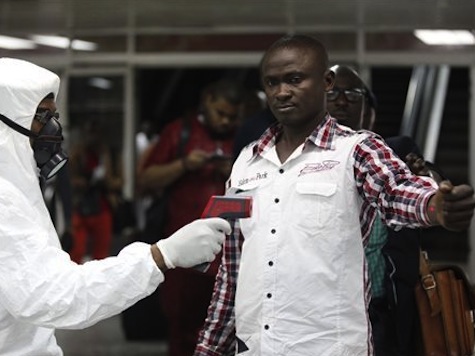(AFP) Worries over the worldwide spread of Ebola grew Thursday after three more health workers were quarantined in Spain and North America threw up border controls at main ports of arrival from the plagued African states.
The United States and Canada announced new screening measures at major airport hubs to check travellers for symptoms of the deadly disease, and pressure grew for other nations to follow their lead.
The Madrid hospital treating infected Spanish auxiliary nurse, Teresa Romero, also announced her condition had worsened on Thursday.
Romero, the first person known to have been infected with Ebola outside of Africa, has said she may have caught the deadly virus after touching her face with an infected glove after cleaning the Madrid hospital room of an elderly Spanish missionary. The man, who contracted Ebola in west Africa, later died.
Three more health workers in Madrid were admitted to hospital for monitoring for Ebola late on Wednesday, including a hospital emergency room doctor who attended Romero.
EU officials have rushed to reassure citizens Europe is well armed to prevent an Ebola epidemic, but experts pointed to some gaps in public health systems which could be called upon to ward off contagion of the tropical fever.
Notable concerns, he said, were countries which have endured the biggest public spending cuts, like Greece and Spain, and where staff and resources are lacking.
Germany took in a third UN employee infected with Ebola on Thursday — a Sudanese doctor who had been working in Liberia, and was admitted to a clinic in the eastern city of Leipzig.
Meanwhile, an Australian woman, who recently returned from working with Ebola patients in Sierra Leone, was being assessed in Brisbane for the disease, which has no known cure and kills nearly half of all infected.
The world’s largest outbreak of Ebola has killed 3,865 people out of 8,033 infected so far this year, mainly in Liberia, Sierra Leone and Guinea, according to the World Health Organization’s latest count.
– Focus on Spain infection –
Questions over Spain’s handling of the affair have been raised after it emerged that the nurse, Romero, began to feel ill on September 29 while on leave after treating the missionaries, but she was not admitted to hospital until seven days later.
One of the doctors who first attended her at a hospital at Alcorcon on the outskirts of Madrid, Juan Manuel Parra, complained in a report published Thursday in daily newspapers El Pais and El Mundo that the sleeves of his protective suit “were too short”.
He said he learned that Romero had tested positive for Ebola through the media, and said the patient spent hours at the hospital in poor health waiting to be transferred to the Madrid hospital where she works and which is specially equipped to deal with Ebola cases.
Parra described her health status at the time as “unstable, with a high risk of complications and the need for round-the-clock attention, with diarrhoea, secretion, vomit and menstruation.”
He was admitted to Madrid’s La Paz-Carlos III hospital for monitoring for Ebola late on Wednesday along with another doctor and a nurse, the hospital said in a statement.
In total there are now six people in quarantine at the hospital, but only Romero has been diagnosed with Ebola.
– Stepped-up screenings –
Among Ebola’s latest victims is Thomas Eric Duncan, the first patient cared for in the United States to die of the disease.
Just as his death was announced US officials also ordered increased screening at five major airports including in New York, Washington, Chicago, Atlanta and New Jersey.
French Health Minister Marisol Touraine said she was working with the authorities in countries badly affected by Ebola “to see in which conditions we can reinforce departure controls.”
But leaders of the most afflicted nations — Guinea, Liberia and Sierra Leone — are pressing the global community for more help on the frontline of the virus battlefield.
Sierra Leone President Ernest Bai Koroma assailed the response to the epidemic thus far, saying it was moving more slowly than the spread of the disease.

COMMENTS
Please let us know if you're having issues with commenting.